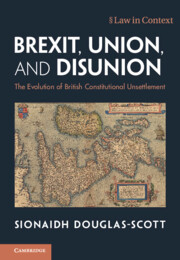Book contents
- Brexit, Union, and Disunion
- Law in Context
- Brexit, Union, and Disunion
- Copyright page
- Contents
- Figures
- Introduction
- Part I Five Case Studies of Acts of Union and Disunion
- Part II Five Themes
- 6 Sovereignty
- 7 Unions and Disunions
- 8 Federalism, Devolution, and Differentiation
- 9 Democracy and Referendums
- 10 Human Rights
- Conclusion
- Index
6 - Sovereignty
from Part II - Five Themes
Published online by Cambridge University Press: 26 October 2023
- Brexit, Union, and Disunion
- Law in Context
- Brexit, Union, and Disunion
- Copyright page
- Contents
- Figures
- Introduction
- Part I Five Case Studies of Acts of Union and Disunion
- Part II Five Themes
- 6 Sovereignty
- 7 Unions and Disunions
- 8 Federalism, Devolution, and Differentiation
- 9 Democracy and Referendums
- 10 Human Rights
- Conclusion
- Index
Summary
Sovereignty is obviously key in the Brexit context, and in many ways lies at the core of this book’s argument – a main part of which is that Britain has never been able to justify its assertion of unlimited parliamentary sovereignty. This book endorses the view that the doctrine of parliamentary sovereignty no longer carries the weight that Dicey accorded it, nor should it. Indeed Dicey was himself inconsistent, and, in his energetic opposition to Irish Home Rule, was prepared to depart from the application of parliamentary sovereignty. And in any case, Dicey’s theory is not watertight historically, and Westminster sovereignty is also territorially challenged. However, it might be argued that EU membership posed the greatest challenge to UK parliamentary sovereignty. However, Britain never lost its external sovereignty (i.e. what is frequently described as ‘national’ sovereignty, whereby a country is sovereign and recognized as independent by the international community) as Britain voluntarily joined the EEC, and also voluntarily exited, with Brexit. But Parliament did constrain its own sovereignty through the ECA 1972, and although that Act has now been repealed by Brexit, there is no reason why Parliament should not place further constraints on its own sovereignty in future.
Keywords
- Type
- Chapter
- Information
- Brexit, Union, and DisunionThe Evolution of British Constitutional Unsettlement, pp. 297 - 333Publisher: Cambridge University PressPrint publication year: 2023

